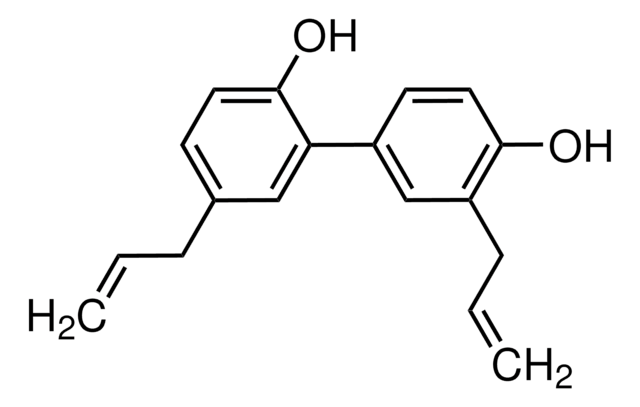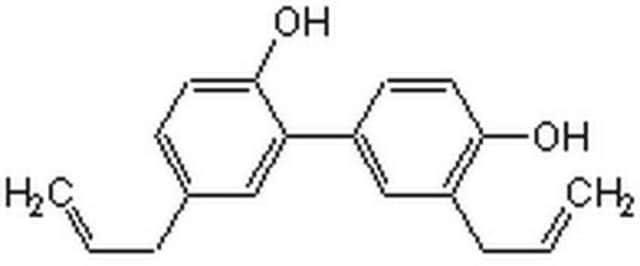M3445
Magnolol
≥90% (HPLC), from plant
Synonym(s):
2,2′-Bichavicol, 5,5′-Diallyl-2,2′-biphenyldiol
About This Item
Recommended Products
biological source
plant
Quality Level
Assay
≥90% (HPLC)
solubility
ethanol: soluble 1 mg/mL
methanol: soluble 1.5 mg/mL
antibiotic activity spectrum
Gram-negative bacteria
Gram-positive bacteria
fungi
application(s)
metabolomics
vitamins, nutraceuticals, and natural products
Mode of action
cell membrane | interferes
storage temp.
2-8°C
SMILES string
Oc1ccc(CC=C)cc1-c2cc(CC=C)ccc2O
InChI
1S/C18H18O2/c1-3-5-13-7-9-17(19)15(11-13)16-12-14(6-4-2)8-10-18(16)20/h3-4,7-12,19-20H,1-2,5-6H2
InChI key
VVOAZFWZEDHOOU-UHFFFAOYSA-N
Looking for similar products? Visit Product Comparison Guide
General description
Application
- to test its effect on muscle atrophy and macrophage subtypes in sarcopenia mouse model
- to test its inhibitory effect on human umbilical vein endothelial cells (HUVECs) in angiogenesis assay
- to test its anti-fungal effects on growth, ultrastructure, and biofilm formation of Candida spp. strains
- in the preparation of immobilized amino-functionalized mesoporous silica particles for prolonged-release studies
Biochem/physiol Actions
Signal Word
Danger
Hazard Statements
Precautionary Statements
Hazard Classifications
Aquatic Chronic 2 - Eye Dam. 1 - Skin Irrit. 2 - STOT SE 3
Target Organs
Respiratory system
Storage Class Code
11 - Combustible Solids
WGK
WGK 3
Personal Protective Equipment
Certificates of Analysis (COA)
Search for Certificates of Analysis (COA) by entering the products Lot/Batch Number. Lot and Batch Numbers can be found on a product’s label following the words ‘Lot’ or ‘Batch’.
Already Own This Product?
Find documentation for the products that you have recently purchased in the Document Library.
Customers Also Viewed
Articles
Chronic inflammation is an underlying factor in the development and progression of many of the chronic diseases of aging, such as arthritis, atherosclerosis, diabetes, and cancer.
Antioxidants protect biological systems from oxidative damage produced by oxygen-containing free radicals and from redoxactive transition metal ions such as iron, copper, and cadmium.
Our team of scientists has experience in all areas of research including Life Science, Material Science, Chemical Synthesis, Chromatography, Analytical and many others.
Contact Technical Service













